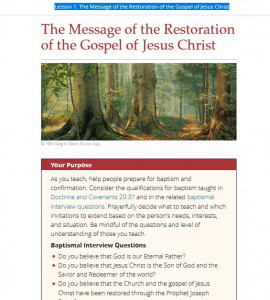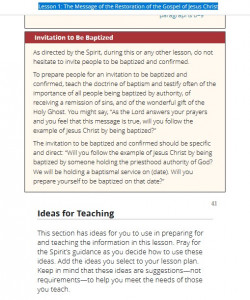Although the leaders of The Church of Jesus Christ of Latter-day Saints spent decades instructing their official teenage representatives to rush to challenge everyone they meet to be baptized, they are apparently baffled as to why their official teenage representatives have for decades rushed to challenge everyone they meet to be baptized:
Church leaders don’t know where these practices began, but “it was never our intention to invite people to be baptized before they had learned something about the gospel, felt the Holy Ghost, and had been properly prepared to accept a lifelong commitment to follow Jesus Christ,” said President Ballard. “Our retention rates will dramatically increase when people desire to be baptized because of the spiritual experiences they are having rather than feeling pressured into being baptized by our missionaries.”
The paragraph occurs in an article from The Church News about a talk President M. Russell Ballard, acting president of the Quorum of the Twelve Apostles, gave in June “to 164 new mission presidents and their companions” (companions meaning wives, since mission presidents are always male and married) about how to get missionaries to be more “Spirit-led,” or inspired by God, when asking people to be baptized.
The first thing I learned in the Missionary Training Center in the mid 1980s was the baptismal challenge, “because you’ll use it more than anything else.” It began, “When Joseph Smith and his scribe, Oliver Cowdery, translated the Book of Mormon, they learned that everyone must be baptized.” As it turned out I didn’t use the baptismal challenge more than anything else, because I felt it was unethical to ask people to commit to joining a church they didn’t know much about. However, I certainly knew it was the expectation:
Some missionaries have felt pressure to invite people to be baptized during the first lesson or even the first contact. “These missionaries have felt that inviting people to be baptized the very first time they meet them demonstrated the missionaries’ faith and supports their thinking that inviting people to be baptized early is what is expected,” [Ballard] said. “Other missionaries have felt that an invitation to be baptized early allowed them to promptly separate the wheat from the tares. In this case, some see the baptismal invitation as a sifting tool.”
Missionaries are typically exceedingly young—still in their teens or barely out of them. The virtues they are told to cultivate are obedience and orthodoxy, not innovation and invention. If missionaries have taken the first opportunity to challenge the people they’re teaching to be baptized, it’s because they were told to. Sure, we were told to listen to the Spirit about when to pop the baptismal question—but we were also told that the Spirit would likely lead us to do so sooner rather than later if we were doing our jobs properly and relying on inspiration about who to teach.
Don’t take my word for it. Check out the church’s website featuring the very first bit of text in the very first lesson for missionaries to teach: it’s all about preparing people for baptism.
Scroll down for instructions about how to give someone an “Invitation to Be Baptized,” also in the first lesson:
As explained in a history of Preach My Gospel, the church’s curriculum for missionaries since 2005, this emphasis on baptism was a deliberate, considered decision by Ballard, who became the chair of the Missionary Executive Council in 2002, and those he oversaw:
When Preach My Gospel was published, one of the main goals in a missionary’s teaching was to connect the baptismal interview questions with the content of what was being taught. Consequently, each of the five lessons in Preach My Gospel has the baptismal interview questions right at the beginning of the lesson.
Asking people to commit to joining the church shortly after they’re introduced to it is indeed problematic: it’s aggressive, confrontational, and creepy, and, as the article from the Church New notes, it makes people “feel like missionaries are more interested in the baptism event than in what they are really experiencing spiritually.”
But also problematic is claiming that adolescent missionaries turned people off from joining the church not because they were following flawed instructions but because they failed to hear and heed divine inspiration. You’d think, if nothing else, that Ballard et al could have asked for more inspiration in devising the missionary lessons, so the missionaries wouldn’t have screwed things up so badly.
For Ballard to feign ignorance of the role of his own work in this situation is a dodge and a deception so craven and contemptible that you have to be embarrassed for him. It would be so easy for him to say, “Our efforts didn’t work as well as planned, so we’re trying something new,” instead of blaming the crappy results on woefully inexperienced missionaries who were doing just what they’d been taught.
As things stand, M. Russell Ballard is gaslighting a bunch of kids who’ve believed that one way to receive inspiration is to listen to him. Clearly, he’s as lost and confused as anyone else.


This is so irritating. Why can’t he just own the past instead of blaming the victims for his and his buddies’ mistakes? When I was in the MTC in the late 80’s, we were instructed to talk about baptism at the end of the 1st discussion. Ballard, himself, was the apostle over where I was on my mission and during one of his barnstorming sessions, while touring the mission, when he wasn’t obsessing over how we should stand when he entered a room, he reiterated the requirement to hit up the potentials with a strong baptismal challenge at the end of the first discussion.
“Forget everything that I have said, or what President Brigham Young or President George Q. Cannon or whomsoever has said in days past that is contrary to the present revelation. We spoke with a limited understanding and without the light and knowledge that now has come into the world. We get our truth and our light line upon line and precept upon precept. We have now had added a new flood of intelligence and light on this particular subject, and it erases all the darkness, and all the views and all the thoughts of the past. They don’t matter any more. ”
Bruce R. McConkie… but it seems appropriate here.
Did anyone growing up in the church feel pressured to get baptized when they turned eight years old? I certainly did. In fact, I wasn’t actually given a choice. It was going to happen no matter what.
Same coercion was used to go on a mission.
And again to get married to the first girl I date. (My mission president was advising me to do that. Thankfully I was able to dodge that one but it wasn’t without a fair amount of terrible drama from all around. )
I could go on.
Oh and turning down a calling? That REALLY hurt the bishop’s feelings and I remember being made to feel like I had done the most horrible thing to someone.
There is a pattern here.
In the MTC we called it, “The Commitment Pattern” as it was taught to us out of the missionary training manual we studied every morning. A few of us woke missionaries called it “The Manipulation Pattern”.
I felt as much pressure to get baptized when I turned eight as I felt pressure to go to first grade when I was old enough for that, which is to say that it never occurred to me that I had the option to refuse.
Yeah, same. It was certainly never presented to me as a decision I would need to make.